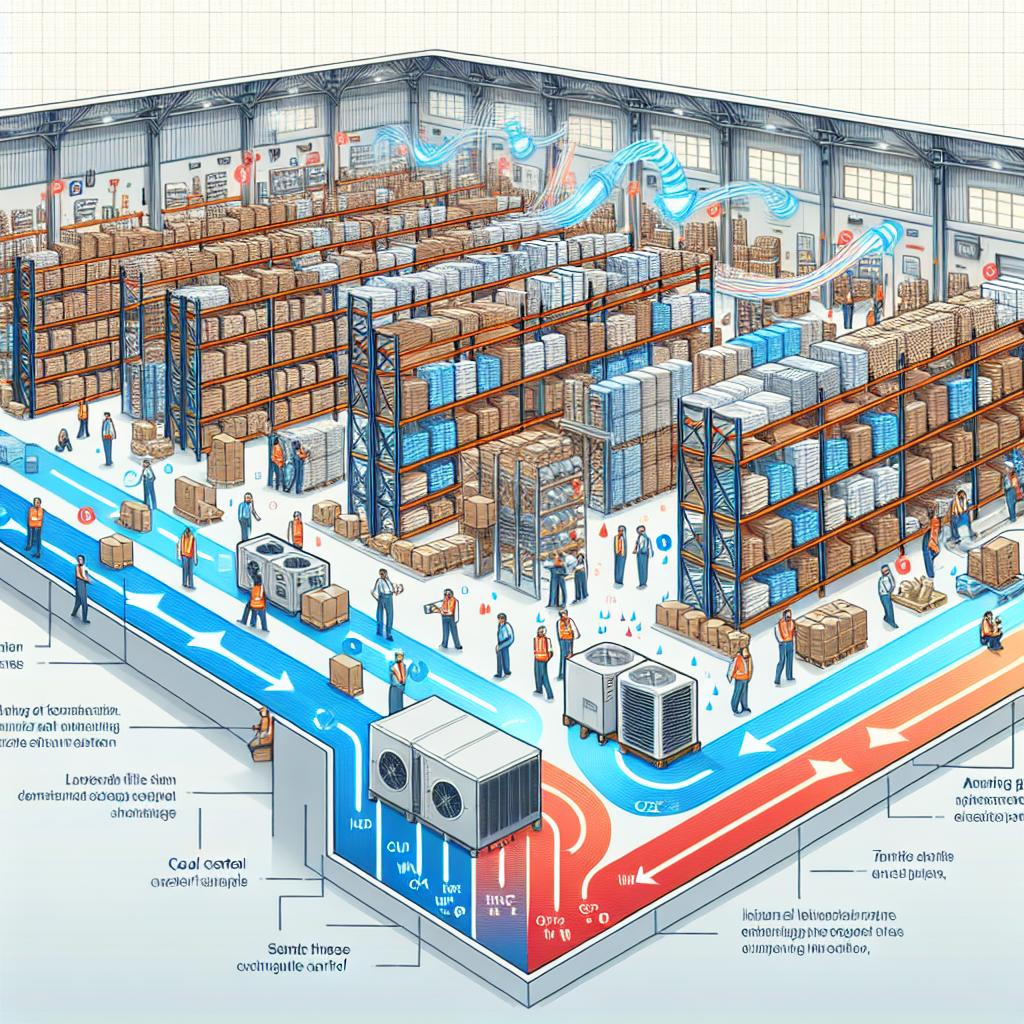In the vast expanse of warehouses and industrial facilities, where temperature control can be as challenging as managing inventory, finding the right cooling solution is paramount. Enter the mini split air conditioner—a compact yet powerful contender reshaping the climate control landscape. Unlike traditional HVAC systems that can be bulky and cumbersome, mini splits offer a range of advantages tailored for the unique needs of large, often complex environments. From energy efficiency to versatility, these systems are not just a trend; they represent a strategic shift toward smarter, more effective cooling solutions. In this article, we will explore the top advantages of using mini split AC systems, illuminating how they can transform warehouse and industrial operations while maintaining an optimal working environment for employees and equipment alike.
Exploring Energy Efficiency Benefits of Mini Split AC Systems
Mini split AC systems offer an impressive combination of comfort and efficiency, making them an ideal choice for warehouses and industrial facilities. One of the most notable aspects of these systems is their zoned cooling capability, which allows for precise temperature control in different areas. This not only maximizes energy savings but also ensures that employees and equipment remain in optimal conditions. Additionally, mini splits operate without ductwork, significantly reducing energy losses that often occur in traditional systems. By harnessing inverter technology, these units can adjust their output to match the current cooling demand, leading to lower electricity bills and a smaller carbon footprint.
Another significant benefit is the ease of installation and maintenance associated with mini split AC systems. Unlike conventional systems that may require extensive modifications to existing structures, mini splits can be installed rapidly with minimal disruption to daily operations. They also come equipped with advanced filtration systems that improve indoor air quality by reducing dust and allergens. Moreover, the compact nature of the units means they can be strategically placed to achieve optimal airflow without taking up valuable floor space. investing in mini split AC technology not only enhances comfort but contributes to a more efficient and sustainable operational environment.

Enhancing Temperature Control for Optimal Warehouse Operations
Maintaining a consistent temperature in warehouses and industrial facilities is critical for both product preservation and employee comfort. Mini split AC systems offer a versatile and efficient solution for temperature control. They provide individual zone cooling, allowing for tailored temperature settings based on specific product requirements or varying occupancy levels within different areas of the warehouse. This precision minimizes energy waste, as cooling can be focused where it is needed most, rather than uniformly cooling the entire space.
Beyond their efficiency, mini split systems are known for their quiet operation, making them ideal for environments where noise can be disruptive. They are also quick to install and do not require ductwork, which simplifies the deployment process in existing facilities. Additionally, features such as inverter technology allow these systems to adjust their cooling output in real-time, further enhancing energy savings while maintaining optimal temperatures. Here are some key benefits:
- Energy Efficiency: Reduced operational costs through targeted cooling.
- Improved Air Quality: Enhanced filtration systems that contribute to a healthier work environment.
- Flexible Installation: Minimal disruption during setup and adaptable to various warehouse layouts.

Streamlining Installation and Maintenance for Industrial Environments
Integrating mini split AC systems in warehouses and industrial facilities simplifies both installation and maintenance processes. Unlike traditional HVAC systems, which often require extensive ductwork and complex setups, mini splits offer a more flexible solution that can be adapted to various layouts. Quick installation is one of the standout features, as they can be mounted on walls or ceilings with minimal disruption to operations. The ability to install multiple indoor units connected to a single outdoor compressor maximizes cooling efficiency while minimizing the physical footprint of the system.
Furthermore, maintenance becomes a breeze with these systems. The design of mini splits allows for easy access to filters, coils, and other essential components, which simplifies routine checks and cleaning. Regular maintenance tasks such as filter replacement can often be performed by in-house staff, reducing downtime and dependence on external technicians. This accessibility not only lowers overall maintenance costs but also enhances the system’s longevity. A short overview of key advantages highlights this point:
| Advantage | Description |
|---|---|
| Flexible Installation | No extensive ductwork required. |
| Minimal Disruption | Quick setup with less operational interference. |
| Easy Maintenance | Accessible components for routine upkeep. |
| Cost-Effective | Reduced dependency on external service providers. |

Improving Air Quality and Comfort in Large Spaces
In vast warehouses and industrial facilities, achieving optimal air quality and comfort is a necessity for both productivity and employee well-being. Mini split AC systems provide an effective solution by ensuring even air distribution without the need for extensive ductwork. They allow for targeted cooling in specific areas, significantly reducing temperature fluctuations and improving overall air quality. This is particularly beneficial in large spaces where traditional HVAC systems struggle to maintain consistent temperatures.
Moreover, these systems are designed with advanced filtration technologies that can effectively remove pollutants, dust, and allergens from the air. This functionality is essential in environments where airborne particles can impact both employee health and product integrity. Key features that enhance air quality include:
- Multi-zone cooling: Allows for temperature control in different sections.
- Quiet operation: Reduces noise pollution, creating a more comfortable working environment.
- Energy efficiency: Minimizes energy consumption while maximizing air purification.
Q&A
Q&A: Top Advantages of Using Mini Split AC in Warehouses and Industrial Facilities
Q1: What is a mini split AC system, and how does it work?
A1: A mini split AC system is a type of air conditioning solution that consists of an outdoor compressor and one or more indoor units. Unlike traditional HVAC systems, mini splits do not require ductwork, making them especially versatile for large spaces like warehouses and industrial facilities. The outdoor unit absorbs heat from the inside and expels it outside, while the indoor units distribute cool air throughout the space, allowing for precise temperature control in specific areas.
Q2: What are some key advantages of using mini split AC in large industrial spaces?
A2: There are several significant advantages to using mini split AC in warehouses and industrial facilities, including:
- Energy Efficiency: Mini splits are designed to be highly efficient, often using less energy than traditional cooling systems. This is particularly beneficial for large spaces with varying cooling needs, as mini splits allow for zoning—cooling only the areas that require it.
- Improved Air Quality: Mini split systems include advanced filtration options that help to reduce airborne contaminants, which is crucial in maintaining a safe and healthy working environment in industrial settings.
- Quiet Operation: Unlike conventional HVAC systems, mini splits operate quietly, minimizing noise disruptions in a work environment where focus and communication are vital.
- Flexible Installation: With no ductwork required, mini splits can be installed in hard-to-reach areas and provide cooling solutions wherever necessary, maximizing the use of available space.
- Temperature Control: The zoning capability allows different areas within the facility to be maintained at varying temperatures based on their specific cooling needs, ensuring optimal working conditions for employees and protecting sensitive equipment.
Q3: Are there any challenges associated with installing mini split AC systems in these environments?
A3: While mini split systems offer numerous benefits, there are some challenges to consider, such as initial installation costs, which can be higher than traditional systems, especially if multiple indoor units are required. Additionally, the outdoor units must be positioned thoughtfully to avoid potential blockages or damage in a busy industrial area. Regular maintenance is also essential to sustain performance, ensuring filters are cleaned and refrigerant levels are checked, particularly in warehouses with high dust or airborne particulate levels.
Q4: How do mini splits contribute to the sustainability goals of industrial facilities?
A4: Mini split systems are generally more energy-efficient than conventional cooling methods, contributing to reduced carbon footprints for industrial facilities. Their ability to provide targeted cooling minimizes the waste of energy, and many modern mini split units are compatible with renewable energy sources, such as solar panels, allowing warehouses to enhance their sustainability initiatives while maintaining a comfortable working environment.
Q5: Who can benefit from installing a mini split AC system in their warehouse or industrial facility?
A5: A wide range of businesses can benefit from mini split AC systems, including logistics companies, manufacturing plants, distribution centers, and any facility that requires temperature control for equipment or employee comfort. Businesses looking to optimize energy efficiency and improve air quality while reducing operational costs will find mini splits to be a practical and viable solution.
Q6: What should interested facility managers consider before making a decision?
A6: Facility managers should assess their specific cooling needs, including the size of the space, the number of zones required, and budget constraints. Consulting with HVAC professionals can provide insight into the most suitable system configuration, ensuring that the mini split solution aligns with the facility’s operational goals and maintenance capabilities for long-term efficiency.
With their innovative design and considerable advantages, mini split AC units are becoming increasingly popular in warehouses and industrial facilities, proving that comfort and efficiency can go hand in hand in even the most demanding environments.
In Conclusion
the adoption of mini split AC systems in warehouses and industrial facilities offers a wealth of benefits that go beyond mere climate control. From their energy efficiency and flexible installation options to their capacity for zoning and quiet operation, mini splits present a compelling solution to the specific challenges faced in large, dynamic spaces. As industries continue to evolve, embracing technologies that improve comfort and productivity becomes essential. Investing in mini split air conditioning is not just about cooling; it’s about creating an optimal work environment that fosters efficiency and enhances the well-being of your workforce. By making informed choices today, you can ensure a more comfortable, productive, and sustainable tomorrow for your facility. So, as you explore your options, consider how a mini split AC system might serve as the cornerstone of your climate control strategy.

